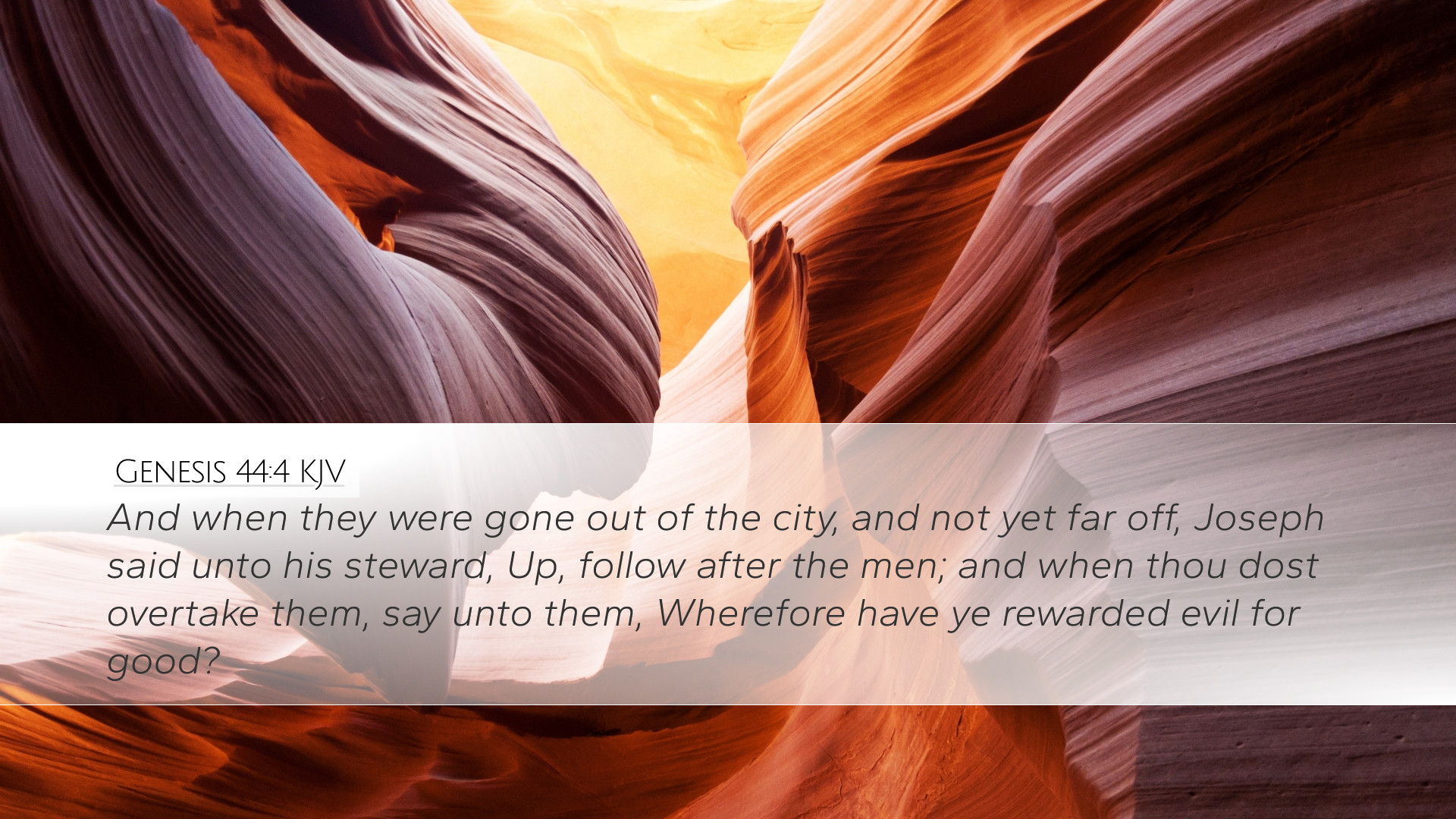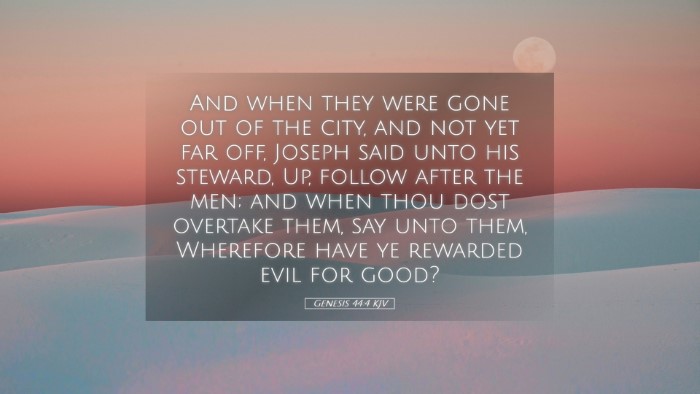Commentary on Genesis 44:4
Verse Context: Genesis 44:4 takes place in the narrative of Joseph's brothers coming to Egypt during a time of famine. This moment comes after Joseph has already revealed his identity to his brothers and has set a plan in motion to test their character. The verse reads:
"And when they were gone out of the city, not yet far off, Joseph said unto his steward, 'Up, follow after the men; and when thou dost overtake them, say unto them, Why have ye rewarded evil for good?'"
Thematic Analysis
1. The Role of Joseph's Steward: Joseph's steward is a significant figure in this passage, acting as the instrument through which Joseph's plan is executed. It illustrates God's sovereignty in using even those in service positions to fulfill His purposes. Just as God employs various means in our lives, the steward’s role emphasizes the divine orchestration behind the events unfolding.
2. Concept of Justice and Retribution: Joseph’s question, "Why have ye rewarded evil for good?" (Genesis 44:4) resonates deeply with the theme of divine justice. Commentators highlight how this moment serves to confront the brothers with their past sins against Joseph. The Lord, through the steward, raises this issue, aiming to provoke reflection and repentance.
Insights from Public Domain Commentaries
Matthew Henry
Matthew Henry emphasizes that Joseph, by sending his steward, was not only testing his brothers but also drawing them into a deeper understanding of their own actions. Henry notes that the steward’s challenge holds a dual purpose: to accuse and draw out the truth from the brothers. Joseph seeks their moral and spiritual growth, which aligns with God’s redemptive plan.
Albert Barnes
Albert Barnes points out that Joseph’s approach reflects both a sophisticated strategy and moral insight. The question posed by the steward is an invitation for the brothers to confront their guilt. This pivotal moment reminds readers of the biblical principle that all sin will eventually be confronted. Barnes interprets this as an affirmation of God’s justice and righteousness, reminding us that past wrongs will be addressed in God’s timing.
Adam Clarke
Adam Clarke provides a linguistics-based analysis of the verse, noting the strategic use of language. Clarke states that the steward’s inquiry was not just about the act of theft but served as an acute reminder of their previous transgressions. Clarke elaborates on how this interaction signifies an intense moment of psychological and emotional struggle for the brothers, bringing to the forefront their hidden guilt and shame.
Theological Reflections
1. God’s Sovereignty in Human Affairs: The unfolding events reveal the sovereignty of God. Even amidst deception and treachery, God works to bring about reconciliation. The brothers, who once sought to harm Joseph, now face circumstances that lead them towards a path of redemption. This theme resonates throughout Scripture, illustrating that God can repurpose human acts for His divine plan.
2. Repentance and Restoration: The confrontation with their guilt serves as a catalyst for the brothers’ eventual restoration. This passage illustrates a key theological principle: before one can experience forgiveness and restoration, one must first be confronted with sin. The divine strategy employed by Joseph aligns with God’s desire for our repentance before we can truly experience His grace.
Practical Applications
- Self-Examination: The narrative prompts believers to engage in self-examination. As believers, we are called to reflect on our past actions and their implications on our relationship with God and others.
- God's Mercy: The story serves as a reminder of God’s mercy and grace. Just as Joseph’s brothers were offered redemption, so too are we offered the opportunity for forgiveness through Christ.
- Role of Relationships: The interactions in this passage question the integrity of our relationships. Joseph's test aimed to reveal the true nature of the brothers, encouraging us to evaluate the authenticity of our connections with others.
Conclusion
Genesis 44:4 encapsulates a moment of tension, revelation, and divine purpose. Through the lens of various commentators, we see a multilayered narrative that extends beyond its immediate historical context to offer profound theological insights relevant to contemporary believers. The complexity of human sinfulness is met with the grace of God, an enduring theme that transcends time and invites individuals into a transformative relationship with the Divine.


